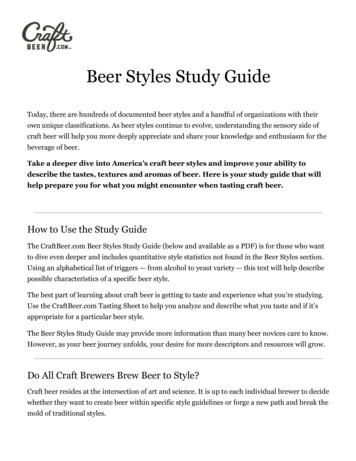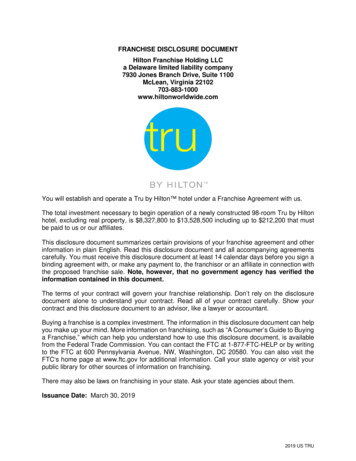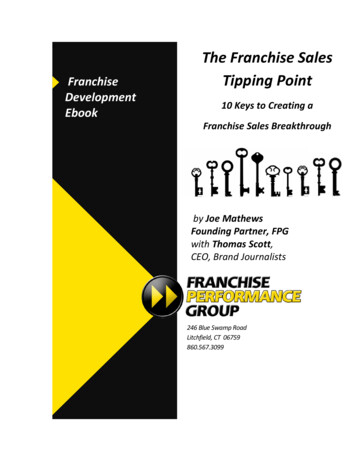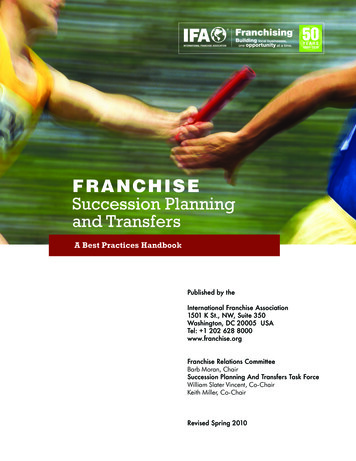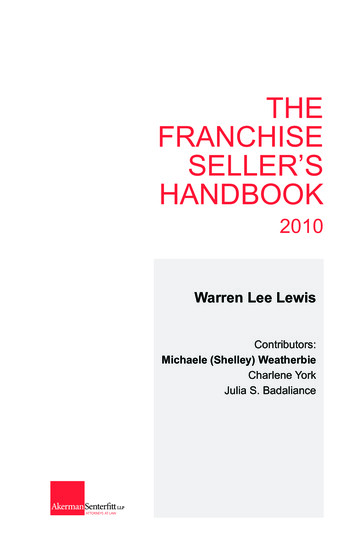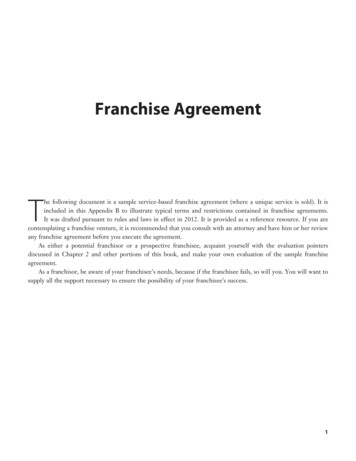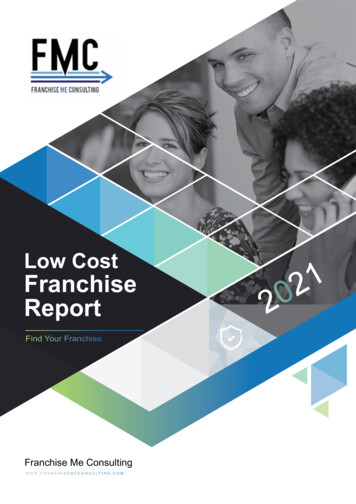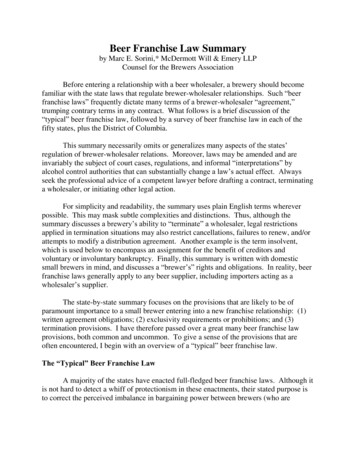
Transcription
Beer Franchise Law Summaryby Marc E. Sorini,* McDermott Will & Emery LLPCounsel for the Brewers AssociationBefore entering a relationship with a beer wholesaler, a brewery should becomefamiliar with the state laws that regulate brewer-wholesaler relationships. Such “beerfranchise laws” frequently dictate many terms of a brewer-wholesaler “agreement,”trumping contrary terms in any contract. What follows is a brief discussion of the“typical” beer franchise law, followed by a survey of beer franchise law in each of thefifty states, plus the District of Columbia.This summary necessarily omits or generalizes many aspects of the states’regulation of brewer-wholesaler relations. Moreover, laws may be amended and areinvariably the subject of court cases, regulations, and informal “interpretations” byalcohol control authorities that can substantially change a law’s actual effect. Alwaysseek the professional advice of a competent lawyer before drafting a contract, terminatinga wholesaler, or initiating other legal action.For simplicity and readability, the summary uses plain English terms whereverpossible. This may mask subtle complexities and distinctions. Thus, although thesummary discusses a brewery’s ability to “terminate” a wholesaler, legal restrictionsapplied in termination situations may also restrict cancellations, failures to renew, and/orattempts to modify a distribution agreement. Another example is the term insolvent,which is used below to encompass an assignment for the benefit of creditors andvoluntary or involuntary bankruptcy. Finally, this summary is written with domesticsmall brewers in mind, and discusses a “brewer’s” rights and obligations. In reality, beerfranchise laws generally apply to any beer supplier, including importers acting as awholesaler’s supplier.The state-by-state summary focuses on the provisions that are likely to be ofparamount importance to a small brewer entering into a new franchise relationship: (1)written agreement obligations; (2) exclusivity requirements or prohibitions; and (3)termination provisions. I have therefore passed over a great many beer franchise lawprovisions, both common and uncommon. To give a sense of the provisions that areoften encountered, I begin with an overview of a “typical” beer franchise law.The “Typical” Beer Franchise LawA majority of the states have enacted full-fledged beer franchise laws. Although itis not hard to detect a whiff of protectionism in these enactments, their stated purpose isto correct the perceived imbalance in bargaining power between brewers (who are
presumed to be big and rich) and wholesalers (who are presumed to be small and local).Temperance concerns are also cited. A full-fledged beer franchise law will usually:1.Define franchise agreements to include informal, oral arrangements, making anyshipment to a wholesaler the start of a franchise relationship.2.Prohibit coercive brewer practices, most often including actions in which a brewer(a) requires the wholesaler to engage in illegal acts, (b) forces acceptance ofunordered beer, or (c) withholds shipments in order to impose terms on thewholesaler.3.Require “good cause” or “just cause” before a brewer can terminate a wholesaler. The burden is generally on the brewer to demonstrate cause for termination. “Good cause” is usually defined to include a significant breach of a“reasonable” and “material” term in the parties’ agreement.4.Dictate that a brewer give prior written notice (60 or 90 days is common) to awholesaler before termination is effective, with the notice detailing the allegeddeficiencies that justify termination.5.Grant wholesalers an opportunity to cure the deficiencies alleged in a terminationnotice, with termination ineffective if a wholesaler cures the defect(s) or presents aplan to cure the defect(s). “Notice-and-cure” requirements usually are waived under certaincircumstances. These most often include a wholesaler’s (a) insolvency, (b)conviction or guilty plea to a serious crime, or (c) loss of a license to dobusiness. Many franchise laws also permit expedited termination where awholesaler (d) has acted fraudulently or (e) has defaulted on a payment underthe agreement despite a written demand for payment.6.Require wholesalers to provide brewers with notice of any proposed change inownership of the wholesaler, giving the brewer an opportunity to object. Thebrewer’s approval of an ownership change cannot be “unreasonably” withheld. Brewers usually have little or no right to block a transfer to a previouslydesignated family successor.7.Create remedies for unfair termination, generally granting wholesalers the right toreceive “reasonable compensation” following termination.
Most beer franchise laws grant wholesalers the right to seek an injunction that,if granted, would quickly halt termination proceedings pending the resolutionof wrongful termination claims. The forum for such relief can be either a statecourt or the state’s alcohol control authorities. Although arbitration of the entire dispute is not required, and sometimesprohibited, disputes over what constitutes “reasonable compensation” oftenmust be arbitrated at the request of a party. Even if the franchise law prohibits arbitration, an arbitration clause in theparties’ written agreement is likely enforceable under the Federal ArbitrationAct if the parties reside in different jurisdictions.8.Declare any waiver of franchise law protections void and unenforceable.9.Set a date that the law becomes effective. Some franchise agreements may predatefranchise acts’ effective dates, likely making the franchise law inapplicable to thatagreement.In addition to the extremely common provisions described above, other termsmay:10.Require beer franchise agreements to be in writing.11.Mandate that sales territories be exclusive. Wholesalers may face substantial penalties for making deliveries outside theirdesignated territory, and such conduct may permit expedited termination by thebrewer. Territorial designations may need to be filed with state liquor controlauthorities.12.Restrict a brewer’s ability to dictate prices, with restrictions that often go beyondthe strictures of antitrust law. Common provisions prohibit brewer price fixing,require brewers to file and adhere to periodic price schedules, and ban pricediscrimination between wholesalers within the state.13.Provide that the prevailing party in a termination dispute will be compensated forits attorneys fees.
14.Bind succeeding brand owners to existing franchise agreements, although somepermit not-for-cause termination after a change in brand ownership, as long ascompensation is paid.15.Impose a good faith obligation on both parties. Under modern contract law, thisgood faith obligation is already implied in all contractual relations.16.Impose specific obligations on wholesalers, occasionally specified to include aduty to properly rotate stock, maintain tap lines, and comply with other reasonablequality control instructions.Most states have enacted at least a few laws that regulate brewer-wholesalerrelations. In some, beer wholesalers are covered by a franchise law protecting all alcoholbeverage wholesalers. In a few states, beer wholesalers are protected by franchise lawsthat apply to a variety of franchise relationships, from beer to burgers. Still otherspartially regulate beer franchise relationships through their alcohol control laws by, forexample, requiring exclusive territories as a condition for licensing. Finally, a few statesand the District of Columbia have, to date, left brewer-wholesaler relations essentiallyunregulated, thereby allowing the franchise relationship to be governed exclusively bythe terms of the parties’ agreement, to be enforced under general contract law principles.Summary of Selected State Franchise Law Provisions1.ALABAMA Ala. Code §§ 28-8-1 to 28-9-11. Written agreement required.Exclusive territories.State approval required before a brand is transferred.Termination upon 60 days’ notice, with wholesaler allowed to submit a planfor cure within 30 days and to cure defects within 120 days.o Immediate termination where wholesaler becomes insolvent, loses licensefor more than 61 days, or is convicted of a felony.o Termination on 15 days’ notice for fraudulent conduct, sales outsideterritory, failure to pay after a written demand for payment, or a transfer ofthe business without brewer’s permission. Termination must be made in good faith and for good cause.o Good cause includes failure to comply with agreement provision that arereasonable and of material significance.2.ALASKA No beer franchise law.
3.ARIZONA Ariz. Rev. Stat. §§ 44-1565 to 44-1567. Exclusive territories are permitted, but not required. Termination must be made in good faith and for good cause.o Good cause includes a failure to comply with a term in the franchiseagreement, unless that term is unconscionable or requires an illegal act.4.ARKANSAS Ark. Code Ann. §§ 3-5-1101 to 3-5-1111 and § 3-5-1416. Exclusive territories, filed with the State. Termination requires 30 days’ notice with opportunity to cure. No termination without good cause and good faith.o Good cause includes a wholesaler’s insolvency, repeated violations of law,or failure to maintain a reasonable sales volume.o Immediate termination permitted for a number of reasons, includinginsolvency, license loss for more than 31 days, and sales outside of thewholesaler’s territory. Small brewery (less than 30,000 barrels a year) is not a supplier and exemptedfrom the above provisions.5.CALIFORNIA Cal. Bus. & Prof. Code §§ 25000.2 to 25000.9. Territorial appointments must be in a written agreement, filed with the State. Regardless of the parties’ agreement, supplier may not terminate a wholesalersolely for wholesaler’s “failure to meet a sales goal or quota that is notcommercially reasonable under prevailing market conditions.” Some brewer-wholesaler relationships, particularly those involving largebrewers, might be covered under California’s general Franchise Relations Act. A manufacturer that unreasonably withholds consent to transfer can be liablefor damages. Recent unpublished Attorney General letter suggested that manufacturerapproval rights over wholesaler personnel decisions and business plans,impositions of changes to wholesaler standards or agreements, control overother manufacturers’ brands, and control of wholesaler ownership changes areunlawful under the California Alcoholic Beverage Control Act.o In Crown Imp., LLC v. Classic Distrib. & Beverage Grp., Inc., to bepublished Cal. App. 3d (2014), the court found that even if you interpret theletter to disallow for a manufacture to unreasonably withhold consent to asale of the distributorship, the law specifically allows for this and a specificstatue controls.6.COLORADO Colo. Rev. Stat. §§ 12-47-405 to 12-47-406.3.
Exclusive territories in a written contract, filed with the State. Franchise protections applicable to manufacturers producing at least 300,000gallons of malt beverages annually. Termination upon 60 days’ notice, with wholesaler opportunity to cure duringthat period.o Grounds for immediate termination include failure to pay after writtendemand, insolvency, license loss for more than 14 days, fraud, and salesoutside of the wholesaler’s territory.o Not-for-cause termination permitted upon 90 days’ written notice, withcopies to all other wholesalers in all other states with the same agreement.7.CONNECTICUT Conn. Gen. Stat. § 30-17. Franchise protections apply following product distribution for more than sixmonths. Termination in writing, setting forth reasons and giving the wholesaler anopportunity to challenge.o Prior to termination, a brewer may appoint a replacement wholesaler,provided that the appointment is not effective until six months after thewholesaler receives notice of termination. Termination for “just and sufficient cause,” to be determined in a hearingbefore the Liquor Control Commission.8.DELAWARE Del. Code Ann. tit. 6, §§ 2551 to 2556; 4 Del. Code Regs. § 46. Territorial arrangements filed with the State. Where parties have an exclusive arrangement, brewer must obtain ABCCconsent before appointing a second distributor. Termination upon 60 days’ notice, with wholesaler opportunity to cure duringthe notice period. Good cause is required to terminate a wholesaler without paying “reasonablecompensation,” which includes the laid-in cost of inventory and goodwill.o Good cause includes, among others, a wholesaler’s refusal to comply with amaterial provision of the franchise that is essential, fair, and reasonable;failure to meet reasonable and fair performance standards; insolvency; andlicense loss for more than 30 consecutive business days.o Not-for-cause termination is allowed, provided the brewer receives thepermission of the Commission to pay “reasonable compensation” and thetermination does not violate the terms of the franchise agreement.9.DISTRICT OF COLUMBIA No beer franchise law.
10.FLORIDA Fla. Stat. §§ 563.021 to 563.022. Exclusive sales territories, in writing, and filed with the State. Termination upon 90 days’ notice, with wholesaler permitted to cure defectswithin the notice period. Termination without good cause is forbidden.o Good cause includes a violation of a reasonable and material contract term.o Termination upon 15 days’ notice is allowed in certain instances such asinsolvency, license loss for more than 60 days, fraud, and sales outside ofthe wholesaler’s territory.11.GEORGIA Ga. Code Ann. §§ 3-5-29 to 3-5-34; Ga. Comp. R. & Regs. 560-25.10. Exclusive sales territories, filed with the State. Termination notice containing specific reasons for termination must be filedwith the State, giving the State and wholesaler 30 days to object and request ahearing. Georgia Department of Revenue decides whether to allow atermination. Justifications for termination include a wholesaler’s financial instability,repeated violations of law, or failure to maintain sales volume that isreasonably consistent with other wholesalers of the brand.12.HAWAII No beer franchise law.13.IDAHO Idaho Code Ann. §§ 23-1003; 23-1101 to 23-1113. Territorial agreements must be filed with the State. Termination upon 90 days’ notice, with 30 days to submit a plan of correctiveaction and an additional 90 days to cure defects.o Termination without notice-and-cure permitted upon the wholesaler’sbankruptcy, conviction of a felony, loss of license for more than 30 days,sales outside of the wholesaler’s territory, transfer without consent, failureto pay within five business days of written demand for payment, or fraud.14.ILLINOIS 815 Ill. Comp. Stat. 720/1 to 720/10. Written contract required. Exclusive territories permitted.
Termination upon 90 days’ notice, with opportunity for the wholesaler to curewithin notice period.o Immediate termination permitted for wholesaler’s insolvency, default onpayments, conviction of a serious crime; attempt to transfer businesswithout approval, permit revocation or suspension, or fraud in dealingwith the brewer. Termination must be for good cause, following good faith efforts to resolvedisagreements.o Good cause includes failure to comply with essential and reasonablerequirements of the franchise agreement that are consistent with the law. A brewer may not discriminate among wholesalers when enforcing agreementswith wholesalers. Small suppliers whose annual volume of beer products supplied represents10% or less of wholesaler’s entire business have a mechanism to terminateupon payment of reasonable compensation to the wholesaler.o Compensation, if not agreed upon, subject to a potentially lengthyarbitration or litigation process. Pending bill (as of April 2014) seeks toamend to permit termination in 6 months while process proceeds.15.INDIANA Ind. Code §§ 7.1-5-5-9. Exclusive territories permitted, not required. Prohibits unfair terminations by suppliers or wholesalers, described as thosewithout due regard for “the equities of the other party.” Currently pending legislation (as of April 2014) would allow a “small brewer”of less than 30,000 barrels to terminate the agreement without cause withnotice and payment of a multiple of gross profit. Number is based on thetiming of the termination.16.IOWA Iowa Code §§ 123A.1 to 123A.12. Written agreement with exclusive territories required. Termination upon 90 days’ notice, with the wholesaler given 30 days to submita plan to correct deficiencies within 90 days.o Immediate termination permitted upon a wholesaler’s failure to pay whendue after written demand, insolvency, dissolution, conviction of a crimethat would adversely affect its ability to sell beer, an attempted transferwithout approval, fraudulent conduct in dealing with the brewer, licenseloss for more than 31 days, or sales outside the territory. Termination must be in good faith and supported by good cause.o Good cause exists if the wholesaler failed to comply with reasonable andmaterially significant requirements of the agreement that are legal and do
not discriminate as compared with the requirements imposed on or enforcedagainst similarly-situated wholesalers.o Good faith means honesty in fact and the observance of reasonablestandards of fair dealing in the trade, as interpreted under Iowa’s UniformCommercial Code.17.KANSAS Kan. Stat. Ann. § 41-410. Agreements must be in writing. Exclusive territories, filed with the State. Termination must be for reasonable cause.o Must file written termination notice with the agency at least 30 days beforethe effective termination date.18.KENTUCKY Ky. Rev. Stat. Ann. §§ 244.585; 244.602 to 244.606. Written contract, designating exclusive territories, filed with the State. Good cause and good faith required for termination Termination upon written notice and reasonable opportunity (60 to 120 days)to cure.o Grounds for termination include insolvency, felony conviction, fraud,license loss for more than 31 days, sales outside of the wholesaler’sterritory, and ownership change without consent.19.LOUISIANA La. Rev. Stat. Ann. §§ 26:801 to 812. Written agreement required. Exclusive territories. Termination upon 30 days’ notice, with termination ineffective if thewholesaler produces a plan for corrective action within the notice period thatwill cure the defect within 90 days.o Immediate termination permitted for numerous contingencies, including awholesaler’s insolvency, loss of license, conviction of a serious crime, orfraudulent conduct towards the brewer. Termination for good cause only.o Good cause includes wholesaler’s failure to comply with a reasonable andmaterial term of the agreement.20.MAINE Me. Rev. Stat. Ann. tit. 28-A, §§ 1451 to 1465. Exclusive territories, filed with the State. Termination requires at least 90 days’ notice, plus a reasonable time to cure.
o Immediate termination permitted upon wholesaler’s bankruptcy, loss oflicense, or conviction of a serious crime. Termination must be for good cause.o Good cause does not include a change in wholesaler ownership, butincludes a wholesaler’s loss of license, insolvency, or failure tosubstantially comply with reasonable and material terms of the agreement.21.MARYLAND Md. Code Ann., art. 2B, §§ 17-101 to 17-107. Exclusive territories. Termination upon 180 days’ notice, with 180 days for the wholesaler to cureany deficiency.o No notice required to terminate for a wholesaler’s insolvency. Termination must be for good cause.o Good cause always includes a wholesaler’s loss of license.22.MASSACHUSETTS Mass. Gen. Laws. ch. 138, § 25E. No refusals to sell after six months of regular sales. Termination upon 120 days’ notice to wholesaler and the State.o Termination may be suspended upon wholesaler’s request, pending ahearing before the Alcoholic Beverage Control Commission.o Pending bill (as of April 2014) would allow for a quicker hearing by theCommission. Termination only for good cause.o Good cause limited to wholesaler’s disparagement of the brewer’s product,unfair preference of a competing brand, failure to exercise best efforts,encouragement of improper practices, or failure to comply with contractterms.23.MICHIGAN Mich. Comp. Laws §§ 436.1401; 436.1403. Written agreement with exclusive territories. Termination upon written notice, with the wholesaler having 30 days in whichto submit a plan to cure deficiencies within 90 days.o Termination upon 15 days’ notice is permitted upon a wholesaler’s fraud indealing with the brewer, sales outside its territory, or sales of goods knownto be ineligible for sale.o Immediate termination is permitted upon a wholesaler’s insolvency, loss oflicense for more than 60 days, or conviction of a felony. Termination by the brewer must be in good faith and for good cause.o Good cause is established by a wholesaler’s failure to comply withreasonable and material contract terms.
24.MINNESOTA Minn. Stat. §§ 325B.01 to 325B.17. Exclusive territories. Termination requires 90 days’ notice, during which time the wholesaler maycure deficiencies.o Termination upon 15 days’ notice permitted upon the wholesaler’sinsolvency, loss of license, or violation of a significant law. Termination must be for good cause.o Good cause does not include a change in brewery ownership, but includes awholesaler’s loss of license, bankruptcy, or failure to substantially complywith reasonable and material terms of the franchise agreement.25.MISSISSIPPI Miss. Code Ann. §§ 67-7-1 to 67-7-23. Written contract and exclusive territories required. Termination upon 30 days’ notice, with the wholesaler given 30 days to submita plan to cure deficiencies within 90 days.o Immediate termination is permitted for a variety of contingencies, includinga wholesaler’s fraudulent conduct towards the brewer, insolvency, loss oflicense, or failure to make payments according to established credit terms. Termination must be in good faith, for good cause.o Good cause exists when the wholesaler fails to comply with reasonable andmaterial provisions of the agreement, the deficiency arose within the pasttwo years, and the wholesaler failed to cure.26.MISSOURI Mo. Rev. Stat. §§ 311.181 to 311.182; 407.400 to 407.420. Written agreement required. Exclusive territories presumed unless otherwise provided for by writtenagreement.o Community of Interest must exist for there to be a franchisor-franchiseerelationship per Missouri Beverage co., Inc. v. Shelton Bros., Inc. 669 F3d873 (2012). The court found no relationship because wholesaler’s sales ofimporter’s products never exceed 1.16% of wholesaler’s annual sales, itsname was not used in marketing, and it made no sizable investmentsparticular to the importer. Termination upon 90 days’ notice.o Immediate termination upon criminal misconduct, fraud, abandonment,insolvency, or issuing an NSF check. Termination requires good cause.
o Good cause includes failure to comply substantially with essential andreasonable terms of the parties’ contract, bad faith, or wholesaler’s loss oflicense for more than 31 days.27.MONTANA Mont. Code Ann. §§ 16-3-217 to 16-3-226. Written contract, filed with the State. Agreement must include a list of mandatory terms, and designate exclusiveterritories. Termination upon 60 days’ notice, with the wholesaler given a reasonable timeto cure deficiencies.o Mandatory term in every contract includes a procedure for the regularreview and correction of wholesaler deficiencies. Termination must be for just cause or in accordance with brewer’s contractterms, as applied equally to all wholesalers within the State.28.NEBRASKA Neb. Rev. Stat. §§ 53-201 to 53-223. Written agreement required. Exclusive territories, filed with the State. Termination upon 30 days’ notice, with the wholesaler given a reasonableopportunity to cure deficiencies within 90 days.o Termination upon 15 days’ notice permitted in certain circumstances,including a wholesaler’s fraudulent conduct towards the brewer, salesoutside its territory, failure to pay according to the agreement’s terms andafter written demand, and intentional cessation of brand business for morethan 31 days.o Immediate termination permitted upon the wholesaler’s insolvency, loss oflicense, conviction of a felony, or an agreement to terminate. Termination must be in good faith and for good cause.o Good cause includes a wholesaler’s failure to comply with reasonable andmaterial provisions of the contract.o Good faith means factual honesty and the “observance of reasonablecommercial standards of fair dealing in the trade,” as interpreted by theUniform Commercial Code. Wholesaler is obligated to maintain clean taps, adhere to the brewer’s freshnessprogram, and comply with other reasonable written quality control standards.29.NEVADA Nev. Rev. Stat. §§ 597.120 to 597.180. Exclusive territories presumed, but non-exclusive franchise permitted ifspecified in writing. Termination upon 90 days’ notice, with 60 days to cure deficiencies.
o Termination upon written notice after wholesaler’s loss of license for morethan 31 days, insolvency, conviction of a felony, fraud toward the brewer,sale of beer to an unlicensed retailer, failure to pay according to agreementand seven days after demand for payment, attempt to transfer withoutnotifying the brewer, or discontinuance of the brewer’s brand. Termination must be for good cause.o Good cause means either the wholesaler’s failure to substantially complywith essential and reasonable requirements of the agreement or thewholesaler’s bad faith acts in carrying out the agreement.o Brewers selling less than 2,500 bbls. within the State in a calendar year areexempt from the good cause termination requirement.30.NEW HAMPSHIRE N.H. Rev. Stat. Ann. §§ 180:1 to 180:12. Written agreement. Exclusive territories. Termination upon 90 days’ notice, with wholesaler given a reasonable time tocure deficiencies.o Immediate termination permitted upon the wholesaler’s insolvency, loss oflicense, conviction of a serious crime, willful breach of a material provisionof the franchise agreement; attempt to transfer business without notice tothe brewer, fraud, or failure to pay account upon demand. Termination only for good cause.o Good cause generally includes a wholesaler’s loss of license, insolvency, orfailure to substantially comply with the brewer’s reasonable and materialrequirements.31.NEW JERSEY N.J. Rev. Stat. §§ 33:1-93.12 to 33:1-93.20. Exclusive territories required unless dualing prior to March 1, 2006. Written agreements required. Termination upon written notice and 120 days to cureo Immediate termination upon insolvency, felony conviction, fraud, licenseloss for more than 31 days, intentional sales outside of the wholesaler’sterritory, or transfer of business without consent. Good cause required for termination.o Good cause means a wholesaler’s failure to substantially comply with areasonable term of the non-discriminatory franchise agreement.32.NEW MEXICO N.M. Stat. §§ 60-8A-1; 60-8A-2; 60-8A-7 to 60-8A-11. Exclusive territories permitted, and must be filed with the State. Termination must be in good faith, for good cause.
o Good faith means factual honesty and observance of reasonable commercialstandards under the circumstances.o Good cause includes a wholesaler’s failure to substantially comply withessential and reasonable contract provisions, or bad faith actions.o Good cause does not include wholesaler consolidation.33.NEW YORK N.Y. Alco. Bev. Cont. Law § 55-c. Written agreements required. Termination for cause upon written notice, with wholesaler given 15 days (ormore by court order) to submit a plan to cure deficiencies within 75 days.o Time for corrective action may be limited by a wholesaler’s prior failure tosatisfactorily cure deficiencies, or if the brewer’s product makes up lessthan either 1,000 cases or 1/2 of 1% of wholesaler’s total purchases.o Wholesaler can demand that brewer supply it with a written plan for curingdeficiencies.o Immediate termination permitted upon a wholesaler’s insolvency,conviction of a felony, loss of license for more than 31 days, fraudulentconduct towards the brewer, failure to pay monies due under the agreement,acts constituting grounds for termination under the agreement, or under awritten agreement to terminate. Upon 15 days’ notice, a brewer may terminate a multiple brand wholesalerwithin 120 days of a competing brewer’s loan to or acquisition of an interest inthat wholesaler. Termination only for good cause.o Good cause includes the brewer’s implementation of a national or regionalconsolidation policy (upon 90 days’ notice) that is reasonable,nondiscriminatory, essential, and disclosed in writing, or the wholesaler’sfailure to comply with a material term of the franchise agreement.o Termination based upon consolidation requires payment of to wholesaler of“fair market value” of wholesaler’s lost business. Small brewers (annual volume less than 300,000 barrels and sales towholesaler 3% or less of wholesaler’s annual business) may terminate anagreement without good cause upon payment of fair compensation to thewholesaler.34.NORTH CAROLINA N.C. Gen. Stat. §§ 18B-1300 to 18B-1308. Exclusive territories, filed with the State. Termination upon 90 days’ notice, with wholesaler given 45 days to cure.o Immediate termination permitted upon the wholesaler’s insolvency, loss oflicense for more than 30 days, conviction of a serious felony, fraudulent
conduct in dealing with the brewer, failure to pay for delivered beer, ortransfer of the business without notice to the brewer. Termination requires good cause.o Good cause means a wholesaler’s failure to comply with contract terms thatare reasonable, material, and not unconscionable or discriminatory.o Good cause does not include a change in either brewery ownership or theright to distribute the brand,
8. Declare any waiver of franchise law protections void and unenforceable. 9. Set a date that the law becomes effective. Some franchise agreements may predate franchise acts' effective dates, likely making the franchise law inapplicable to that agreement. In addition to the extremely common provisions described above, other terms may: 10.



